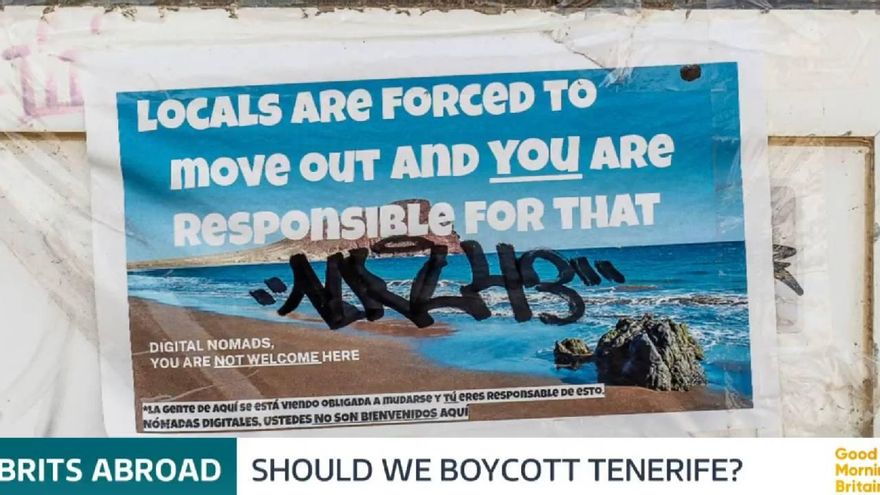
Is there anti-tourism sentiment in Tenerife? For some British tourists, the answer is affirmative. At least, that’s what has been raised by a British television station which interviewed British tourists who had returned to the UK after Easter holidays in Tenerife. They claim to have come across graffiti reading: “Tourist go home”, among other offensive graffiti.
Faced with this rejection visible in some touristic areas of the island, and in an unprecedented intervention on a British television channel targeting the primary tourism market of the Canary Islands in general, and Tenerife in particular, they have stated that if “we don’t want them on the island” on holiday then “Should the British boycott Tenerife?”
In an interview with actress Debbie Arnold, she stated that she felt that the residents of the Canary Islands have declared war and are “fed up” with British tourists. She claims that Canary Islanders believe that the British only “drink cheap beer, lie in the sun, and eat low-quality food”. Therefore, “Should we boycott Tenerife?”, they wonder.
Also against digital nomads
[–>
In the interview, conducted in a playful yet critical tone, an image is shown with graffiti that reads in both English and Spanish: “People here are being forced to move, and you are responsible for this. Digital nomads, you are not welcome here”.
Protests against the tourism-based economic model are beginning to worry representatives of the sector and politicians. Just this Wednesday, Jorge Marichal, the president of the hotel association of Santa Cruz de Tenerife (Ashotel), denounced that one of the establishments he manages has received calls from foreign clients asking “if it is safe” to travel to Tenerife.
In statements to Cope Tenerife collected by EFE, Marichal warned that “we are jeopardising the way of life of our society” as “televised in prime time” and in British media with “anti-tourism messages”.
He added, “spurred on by two individuals with different views”, in reference to the groups that have called for various demonstrations in the Canary Islands on April 20 to demand a change in the current tourism model, respecting them a lot but wishing “to be able to explain to them what they are doing and the consequences this could have.”
The president of Ashotel expressed his opinion that the activists who have announced a hunger strike if the Government of the Canary Islands does not definitively cancel the construction of La Tejita hotel and the Cuna del Alma complex are “completely misguided” and he accused them of being “populists”.
He emphasized that the developers of both projects have “established rights (…) no matter how -someone- climbs a crane or goes on a hunger strike”.
Regarding demands for a change in the model and measures such as a tourism moratorium, Marichal complained that “people do not understand” that there are fewer hotel and non-hotel establishments than ten years ago even though beds have increased by 2%, and he attributed problems such as traffic jams on the roads or rent increases to the 220,000 holiday accommodation places enabled in this period.
“It is normal to have this certain discontent among the population”, said Marichal, who feels “very sorry” because “people are misinterpreting the message. We don’t have to be anti-tourism but demand that the infrastructure is in line with the tourism model that has changed due to platforms like Airbnb,” he asserted.















